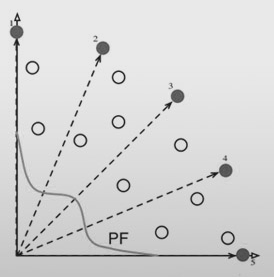Multi-objective Evolutionary Algorithm by Decomposition (MOEA/D-DE)#
-
class moead#
Multi Objective Evolutionary Algorithms by Decomposition (the DE variant)

MOEA/D-DE is a very successful multi-objective optimization algorithm, always worth a try. Based on the idea of problem decomposition, it leverages evolutionary operators to combine good solutions of neighbouring problems thus allowing for nice convergence properties. MOEA/D is, essentially, a framework and this particular algorithm implemented in pagmo with the name pagmo::moead uses the rand/2/exp Differential Evolution operator followed by a polynomial mutation to create offsprings, and the Tchebycheff, weighted or boundary intersection decomposition method. A diversity preservation mechanism, as proposed in the work from Li et al. referenced below, is also implemented.
See also
Zhang, Qingfu, and Hui Li. “MOEA/D: A multiobjective evolutionary algorithm based on decomposition.” Evolutionary Computation, IEEE Transactions on 11.6 (2007): 712-731.
See also
Li, Hui, and Qingfu Zhang. “Multiobjective optimization problems with complicated Pareto sets, MOEA/D and NSGA-II.” Evolutionary Computation, IEEE Transactions on 13.2 (2009): 284-302.
Note
The decomposition weights may be created by sampling on a simplex via a low discrepancy sequence. This allows to have MOEA/D-DE work on populations having arbitrary size, while preserving a nice coverage of the final non-dominated front.
Public Types
-
typedef std::tuple<unsigned, unsigned long long, double, vector_double> log_line_type#
Single entry of the log (gen, fevals, adf, ideal_point)
-
typedef std::vector<log_line_type> log_type#
The log.
Public Functions
-
moead(unsigned gen = 1u, std::string weight_generation = "grid", std::string decomposition = "tchebycheff", population::size_type neighbours = 20u, double CR = 1.0, double F = 0.5, double eta_m = 20., double realb = 0.9, unsigned limit = 2u, bool preserve_diversity = true, unsigned seed = pagmo::random_device::next())#
Constructor.
Constructs MOEA/D-DE
- Parameters
gen – number of generations
weight_generation – method used to generate the weights, one of “grid”, “low discrepancy” or “random”
decomposition – decomposition method: one of “weighted”, “tchebycheff” or “bi”
neighbours – size of the weight’s neighborhood
CR – crossover parameter in the Differential Evolution operator
F – parameter for the Differential Evolution operator
eta_m – distribution index used by the polynomial mutation
realb – chance that the neighbourhood is considered at each generation, rather than the whole population (only if preserve_diversity is true)
limit – maximum number of copies reinserted in the population (only if m_preserve_diversity is true)
preserve_diversity – when true activates the two diversity preservation mechanisms described in Li, Hui, and Qingfu Zhang paper
seed – seed used by the internal random number generator (default is random)
- Throws
value_error – if gen is negative, weight_generation is not one of the allowed types, realb,cr or f are not in [1.0] or m_eta is < 0, if neighbours is <2
-
population evolve(population) const#
Algorithm evolve method.
Evolves the population for the requested number of generations.
- Parameters
pop – population to be evolved
- Returns
evolved population
-
void set_seed(unsigned)#
Sets the seed.
- Parameters
seed – the seed controlling the algorithm stochastic behaviour
-
inline unsigned get_seed() const#
Gets the seed.
- Returns
the seed controlling the algorithm stochastic behaviour
-
inline void set_verbosity(unsigned level)#
Sets the algorithm verbosity.
Sets the verbosity level of the screen output and of the log returned by get_log().
levelcan be:0: no verbosity
>0: will print and log one line each
levelgenerations.
Example (verbosity 1):
Gen, is the generation number, Fevals the number of function evaluation used. ADF is the Average Decomposed Fitness, that is the average across all decomposed problem of the single objective decomposed fitness along the corresponding direction. The ideal point of the current population follows cropped to its 5th component.Gen: Fevals: ADF: ideal1: ideal2: 1 0 24.9576 0.117748 2.77748 2 40 19.2461 0.0238826 2.51403 3 80 12.4375 0.0238826 2.51403 4 120 9.08406 0.00389182 2.51403 5 160 7.10407 0.002065 2.51403 6 200 6.11242 0.00205598 2.51403 7 240 8.79749 0.00205598 2.25538 8 280 7.23155 7.33914e-05 2.25538 9 320 6.83249 7.33914e-05 2.25538 10 360 6.55125 7.33914e-05 2.25538
- Parameters
level – verbosity level
-
inline unsigned get_verbosity() const#
Gets the verbosity level.
- Returns
the verbosity level
-
inline unsigned get_gen() const#
Gets the generations.
- Returns
the number of generations to evolve for
-
inline std::string get_name() const#
Algorithm name.
One of the optional methods of any user-defined algorithm (UDA).
- Returns
a string containing the algorithm name
-
std::string get_extra_info() const#
Extra info.
One of the optional methods of any user-defined algorithm (UDA).
- Returns
a string containing extra info on the algorithm
-
inline const log_type &get_log() const#
Get log.
A log containing relevant quantities monitoring the last call to evolve. Each element of the returned
std::vectoris a moead::log_line_type containing: Gen, Fevals, ADR, ideal_point as described in moead::set_verbosity- Returns
an
std::vectorof moead::log_line_type containing the logged values Gen, Fevals, ADR, ideal_point
-
typedef std::tuple<unsigned, unsigned long long, double, vector_double> log_line_type#